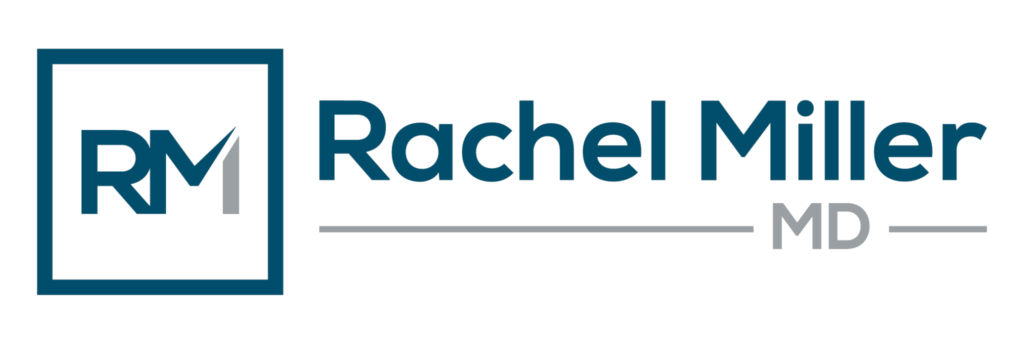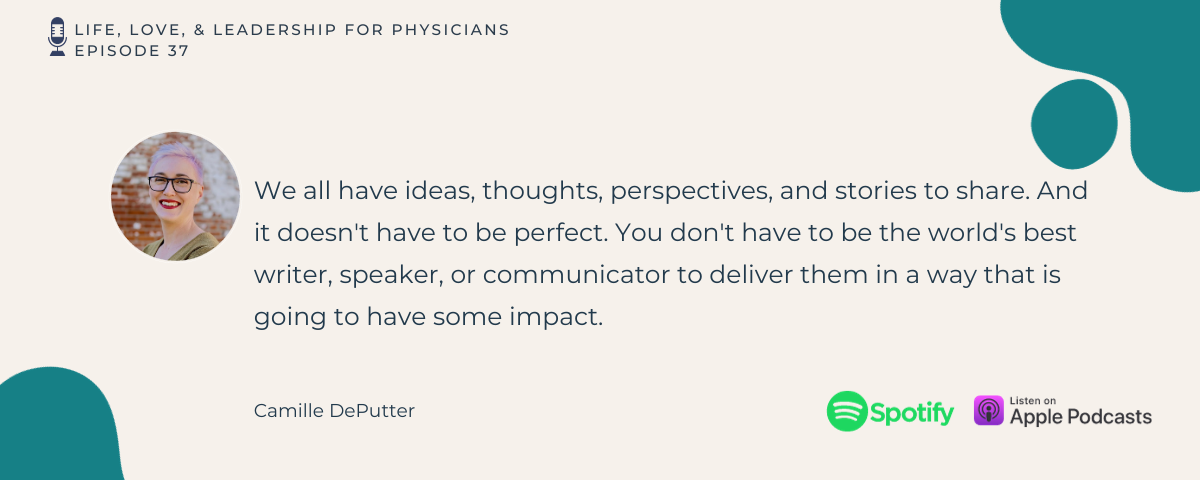Are you eager to create an impact and drive change in healthcare but struggling to communicate your message effectively? As scientifically-minded physicians, expressing our thoughts and ideas in a way that resonates with a broader audience can be a challenge. What is the solution for connecting with your audience? Storytelling!
In episode 37 of the Life, Love, and Leadership for Physicians podcast, Camille Deputter shares how we can use storytelling to bring about change within our organizations. You’ll learn how to become a better communicator, why sharing personal experiences is vital to influencing others, and her best tips for crafting your message.
Camille DePutter is a communications advisor who helps thought leaders express themselves authentically and effectively. By serving as a thought partner, a strategic advisor, and a writing guide, Camille helps her clients communicate their ideas in a compelling and meaningful way. Together, they produce game-changing, award-winning books, courses, speeches, and more. As a result, her clients level up their leadership, turn their brands into legacies and make the impact they were born to make.
How can healthcare leaders become better storytellers and communicators?
Coming from a scientific background, you may feel that you don’t have a storytelling bone in your body — but that’s just not true.
“All human beings are born storytellers. This is the way that our brains work; it’s the way that we make sense of the world. You know, as soon as we’re little kids, we’re putting stories together, we’re making these maps of the world and figuring out how we can get our ideas across, […] and we’re always just looking for ways of interpreting and making sense of information and relating to each other. And that’s really what storytelling is all about. So we all have it, but we just might not have the set of skills or those skills might not be as polished.”
You have a point of view that matters, and you need to spend time developing that point of view before moving on to the finer points of the craft. Ask yourself:
- What is my point of view on this subject?
- How does it differ from the norm?
- What are some of the finer points of what I believe about this?
- What is my vision for the things I want to change?
- Who do I want to reach on this matter?
- Who do I really want to talk to and share this with, and why?
After cultivating your point of view, you can dive into the specific messages you want to share and the stories you can tell to support that.
How can we draw from personal experiences to effectively convey our message?
It’s essential to determine the end message you want your audience to take away with them. Once you know what that is, you can reflect on your past experiences and the lessons you’ve learned that demonstrate this message.
“It doesn’t have to be super dramatic or traumatic. It could just be things you’ve encountered throughout your life or even the course of your day to make a bigger or more important point.”
How can we use storytelling to influence decision-makers or investors to effect change?
It’s easy to get caught up in the features and benefits and forget to take a step back and really think about the person that this project or idea is ultimately for and why they will use it or care about it. You first need to ask yourself:
- Who are they?
- Why do they need this?
- Why does this matter to them?
- How will this impact their life?
Then, you need to communicate this in a way that’s less dry. You can share your story of what inspired the idea, the challenges you faced, the problem that brought you here, or why this is your passion. You can also tell a story that’s not about you but the person it’s for and really paint the picture to bring your story and idea to life.
“Is there a patient that you worked with, a client that you worked with at some point, where you saw their need for this thing? Tell us about that person, and don’t skip over the details. Tell us their name, tell us what they were like. Tell us if this was like a eureka moment where you figured something out. Describe the situation; where were you? Were you stuck in traffic when you had a realization?”
How should you structure your message for success?
Camille isn’t a big advocate for templates or formulas but rather in finding clarity in your message and experimenting to see what works for your audience. So often, people aren’t clear enough and have too much information that isn’t needed to communicate their message. You need to refine your idea and ensure the key points are crystal clear. Share your thoughts with others to get feedback to make sure that it makes sense. Once you have that clarity, you can begin to experiment with where your story fits into the structure of your presentation.
“Sure, you might start with a story sometimes, especially if you’ve got a really strong one. Like if you have one clear, strong story that you want to come out with, like a patient story that is going to really grab people, and they’re going to be so compelled by this, and they’re going to emotionally buy in, then great. But if you and what you’re trying to say is more direct, there isn’t a clear story, or it’s not a super strong fit, you’re almost going to do more harm than good.”
What should you do if it’s taking too long to refine and develop your message?
If you’re wrestling with your idea and constantly scribbling and editing with your red pen, sometimes the best thing to do is to share your idea with others. Listen and learn more about using storytelling to drive change in episode 37 of the Life, Love, and Leadership for Physicians podcast



